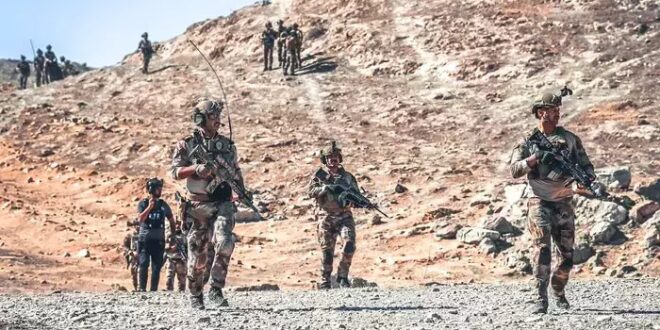Iraqi forces have tracked down and targeted ISIS remnants in their hideouts during a series of operations in provinces across the country.
Iraqi forces have been tracking down and killing key leaders of the “Islamic State of Iraq and Syria” (ISIS) in a series of operations targeting the group’s remnants over a wide geographic area.
During an early February operation, Counter-Terrorism Service (CTS) forces killed six ISIS leaders — three of them in Kirkuk province’s Wadi al-Shay area.
Among them was Hammoud Ibrahim Ahmed Abdullah al-Jubouri, also known as Abu Jaafar, who served as ISIS’s “general sharia official” for Kirkuk, Iraq’s Security Media Cell said.
Also named were Arkan Izz al-Din Hussein Mohammed al-Jagani, known as Abu Harith or Abu Hajar, a “military official” in Kirkuk’s Dibs district; and Mohammad Khalaf Mohammad Sahel al-Jubouri, who commanded a military unit.
During a wide-scale purge of extremists in Wadi al-Shay, a special task force destroyed 22 hideouts and six tunnels — one of which had been booby-trapped — and detonated 10 improvised explosive devices (IEDs) and explosive belts.
In Diyala province, meanwhile, the Iraqi army said it had killed “at least 10 dangerous ISIS leaders” in several operations.
Seven were killed in two strikes carried out by Iraqi F-16 fighter jets in Diyala’s Hamreen hills. One was identified as Sami Mohan, also known as Ibn Abdul Rahman, who commanded ISIS’s ‘Wilayat Diyala’.
Three ISIS elements were killed in another operation targeting ISIS hideouts in the Hamreen hills, Joint Operations Command spokesman Maj. Gen. Tahseen al-Khafaji told Al-Mashareq on February 21.
During an inspection after the attacks, security forces seized weapons, military gear and rifle scopes, he said, and destroyed caves, tunnels and a food warehouse that belonged to the extremists.
Forces from Al-Jazeera Operations Command also killed a “terrorist” in the western Anbar city of Heet, he added, after surrounding him inside his den.
“The military operations commanders continue to target ISIS remnants and their hideouts in all areas of the country based on accurate intelligence information,” he said.
Operation Swords of Truth
Operation Siyouf al-Haq (Swords of Truth) was launched in February to clear ISIS from remote areas between the jurisdictions of the commanders of al-Jazeera operations in Anbar, western Ninawa and Salaheddine.
The multi-force effort is targeting ISIS remnants in areas where intelligence information confirms the group still has cells and small clusters of operatives.
These operatives are hidden in valleys and caves and inside secret tunnels in the desert, al-Khafaji said, and are “being monitored by our forces”.
“We are targeting them in our continuous military operations against terrorists,” he said.
Every tracking operation provides the security forces with a great deal of information about other hiding places, and details on the movements of ISIS elements, he added.
ISIS remnants “do not have any safe place left in Iraq”, he said.
Additionally, the extremists “have no funding source outside the borders, thanks to the great efforts we are making to close all border gaps and secure the border strip, especially with the Syrian side”, he noted.
ISIS elements do not have the ability to carry out attacks on a continuous basis because of the relentless military momentum against them, al-Khafaji added, which does not allow them any opportunity to recover and resume their activities.
 Eurasia Press & News
Eurasia Press & News




